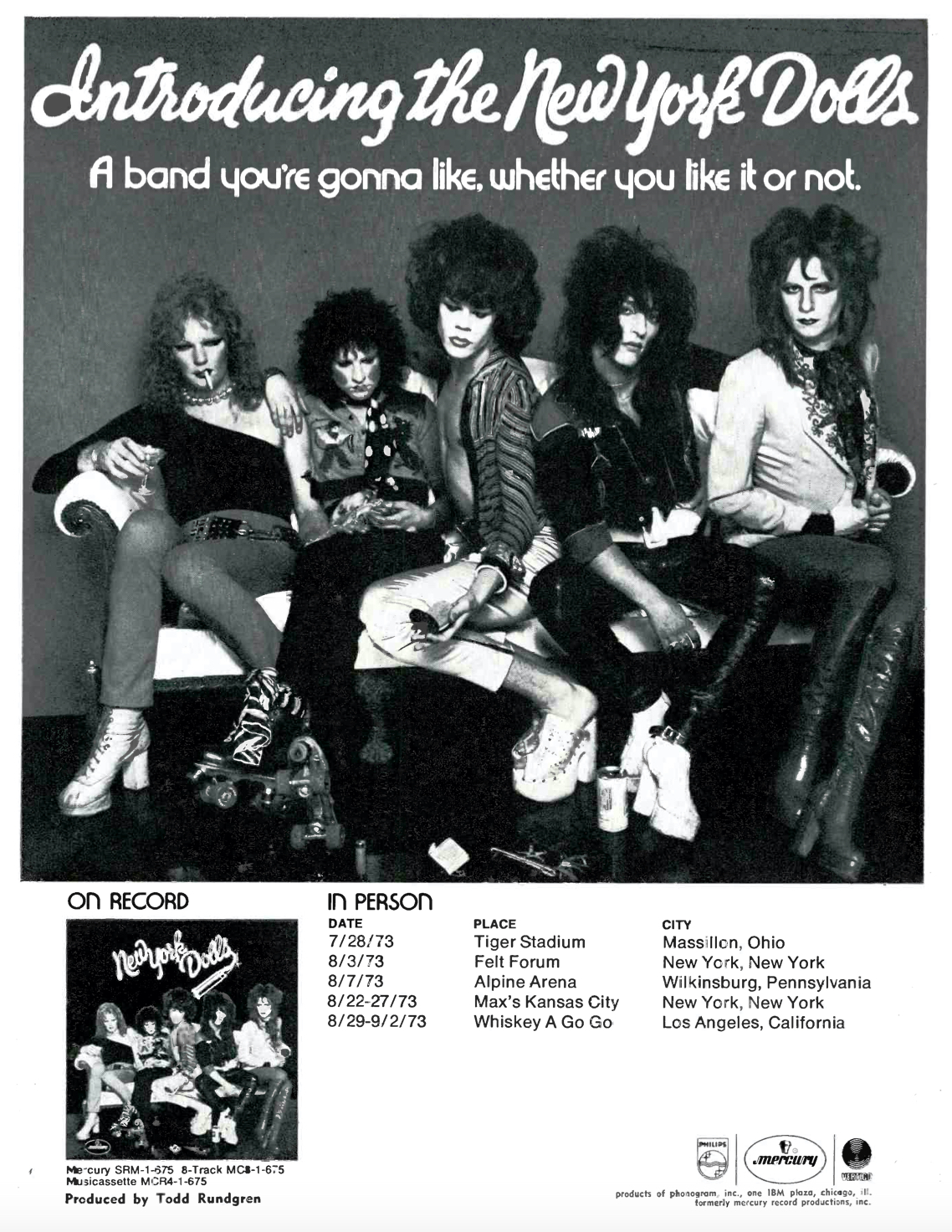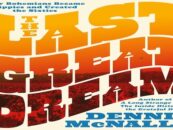 Declared both the Best New Band and Worst Band in Creem magazine’s year-end poll, the New York Dolls were nothing if not polarizing when their self-titled debut album hit the streets. Back then they were occasionally crossdressing Lower Manhattan gutter punks that – despite packing such NYC venues as the Mercer Arts Center and Max’s Kansas City – only reached #116 on the Billboard Album Chart with their debut, released July 27, 1973.
Declared both the Best New Band and Worst Band in Creem magazine’s year-end poll, the New York Dolls were nothing if not polarizing when their self-titled debut album hit the streets. Back then they were occasionally crossdressing Lower Manhattan gutter punks that – despite packing such NYC venues as the Mercer Arts Center and Max’s Kansas City – only reached #116 on the Billboard Album Chart with their debut, released July 27, 1973.
Today, they are hailed as innovators and visionaries. What a difference time can sometimes make.
The album was recorded in eight days at New York City’s Record Plant and mixed in half a day. During the process there was no love lost between the band and the album’s producer Todd Rundgren, who disdained the quintet as amateurish. Their aura of danger, recklessness, flamboyance and decadence was borne out by a trail of death: original drummer Billy Murcia died in 1972 from an overdose; guitarist Johnny Thunders (a longtime heroin addict) in 1991 from indeterminate causes that could have been ill health, drugs and/or foul play; drummer Jerry Nolan the next year from chronic health problems.
Now considered proto-punks, the Dolls were a bridge from glam and early hard rock to punk (the band’s late-in-career manager was Malcolm McLaren, who went on manage the Sex Pistols). They were an inspiration for Kiss and such later metals bands as Motley Crüe, Guns N’ Roses and Hanoi Rocks. Today such album tracks as “Personality Crisis,” “Trash,” “Looking for a Kiss” and “Jet Boy” are regarded by some as rock classics, and the LP is seen as one of rock music’s great debut records.
Watch their dynamic performance of “Personality Crisis” on The Midnight Special on Oct. 19, 1973
HBO’s since-canceled series Vinyl prominently used the Dolls in the series’ pilot with star Bobby Cannavale as record label president Richie Finestra attending one of the band’s performances at the Mercer Arts Center. The show took a few liberties…
In 2004 original members Johansen, Syl Sylvain and Arthur Kane reunited to play London’s Meltdown festival, invited by that year’s curator, Morrisey.
Kane died later that year from leukemia. Johansen and Sylvain released a new Dolls album in 2006, and another in 2009 that was produced by – of all people – Rundgren.
Since 1987, Johansen has also performed as Buster Poindexter. He was born January 9, 1950 and turned 70 in 2020. Sylvain died on January 13, 2021.
Martin Scorsese, one of the creators of Vinyl, directed a 2023 documentary, Personality Crisis, on Dolls’ frontman Johansen for Showtime.
The band’s recordings are available here.






1 Comment so far
Jump into a conversationI think Todd had it right the first time. Personally, I’m a big fan of the glam bands, especially all the Brits. With these folks, the make-up, glitter, flamboyant clothes and lifestyles were just a visual package that framed some incredible music, that was created by some truly innovative musicians and singers. But what is it with the legacy of so many NYC bands that really just play or sing at a beginners’ level, yet are somehow heralded as being “innovators and visionaries?” One would think that “The Greatest City In The World,” being what it is, would turn out some of the greatest music of all time. And while, over time, there’s certainly been some great music to come out of the NYC area (especially from around the areas immediately surrounding the city), the city itself also seems to have had more than it’s share of somewhat or quasi-famous amateurish bands that wouldn’t have been given the time of day by the industry had they come into existence anywhere else. Makeup aside, I saw the Dolls in the early seventies, at — of all places — a music festival in Florida, where they were given a big pump up intro, by of all people, Wolfman Jack, to a Floridian crowd who had no idea who, or what, the Dolls were. To put it plainly, they were simply atrocious. Many of the local NJ bands that were around when I went to high school in the late sixties/early seventies would have blown them out of the water. Outside the clubby trappings of NYC scene, where playing and singing at a rudimentary level has been celebrated as being something artsy, the Dolls came across as being the pathetic band of posers that they were, especially against the backdrop of the other performers at this festival such as early ELO, Rare Earth, and War, just to name a few. I guess you could say that, musically, these early seventies were “the best of times, and the worst of times.